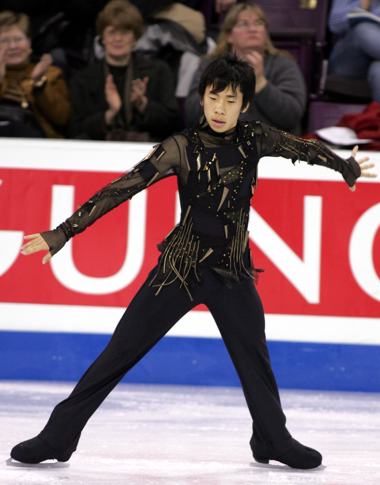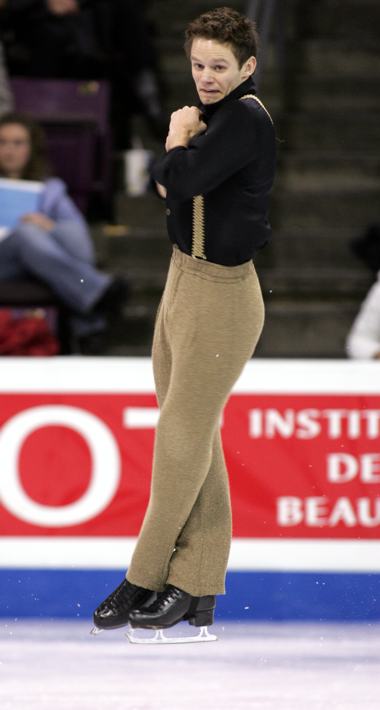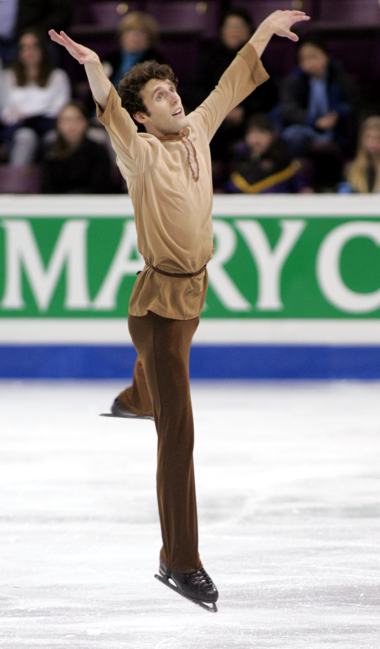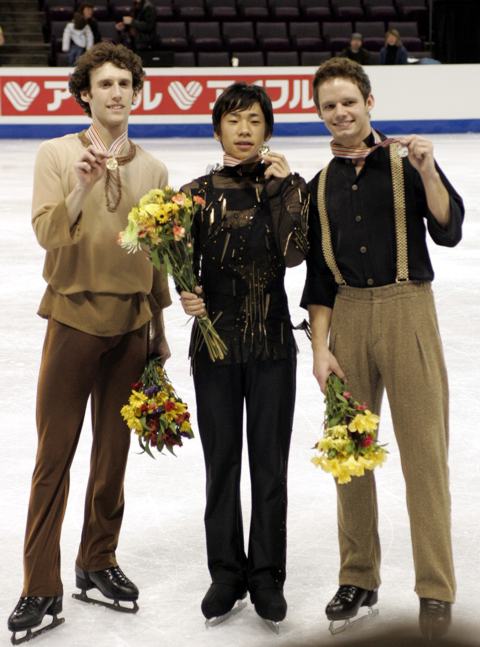|
There are 24 entries from 9 countries. All the nations covered by this event are permitted three entries, which is particularly popular with the countries who are less developed skating wise. They see it as a unique opportunity to get their skaters international experience which is not otherwise available. 1. Nobunari Oda, the 18 year old from Takatsuki City, who is an 17th Century war lord, won with 1.65 points over the second placed Matt Savoie. He gained 1.30 on the elements and 0.35 on the components. Oda trains with Lee Barkell in Barrie, Canada, so he does understand some English. However, he was supervised in his meetings with the press here and when pressed about the unfortunate position in his nationals, he said little. "I skated well at nationals and I was happy." He had been awarded the gold medal but a manual error had failed to discount a repeated move and he well after the podium ceremonies, he had to give the gold back and with it the Olympic place. Japan is, however, sending him to Worlds. Oda presented a superb routine choreographed by David Wilson to Rossiniís Barber of Seville. It contains a moment when, perfectly suiting the music he holds his head and screams noiselessly. "I had good concentration and felt confidence. I really enjoyed my performance," he said, and that certainly appeared that way to the audience. Iím so happy to beat my personal best score." On the triple Axel, Savoie got 0.14 more than Oda. However, Oda did a triple Lutz to triple toe which has a base value of 0.5 more than Savoieís combination triple flip to triple toe, and Oda also got the better GoE for this move, banking a total of 0.93 over Savoie for this. In the solo jump Savoie did a triple Lutz with a 0.5 greater base value than Odaís, although Savoieís GoE was 0.71 to Odaís 1.00. That meant an advantage of 0.21 to Savoie. Both got Level 4 for their Flying Sit Spin with Odaís greater GoE giving him 0.43 more than Savoie. Otaís circular steps were only Level 1 to Savoieís Level 3 a base value difference of 1.3. Savoie also got a slightly better GoE on it and ended up with 1.39 more than his rival. Odaís change foot sit spin was a Level 4 but Savoieís was only a 2. With the GoE, Oda got 1.44 marks over Savoie. Along with the two other moves, Oda ended up 2. Matt Savoie said of his second placed performance, "It was good. It was the cleanest program Iíve done this year so far. I felt like I was still developing artistically throughout it. The altitude didnít bother me." He had bettered his personal best by 10 points. "I havenít done a clean short at an international since the new system started. The 25 year old said his bronze from Nationals "certainly builds my confidence but at the same time, I donít want to rest on my accomplishment. I want to keep improving and trying to maintain the energy that started there." 3. Chris Maybee, a 20 year old from Tillsonburg, Ontario, trained by Lee Barkell in Barrie, presented a Tango by Astor Piazzolla performed by Yo Yo Ma. He lies 3.51 behind Savoie. He said, "I felt great. I felt instantly comfortable. My short has been a little rough all year. It wasnít a matter of me not being able to do it, it was a matter of me getting too excited and too into the moment. I just had to be aware of where I am. I can recall every step of that program where, before, I would have no idea what happened. So the difference is definitely just being aware and knowing whatís going on." 4. Marc Andre Craig is a 23 year old from Sherbrooke, Quebec, who is trained by Josee Normand and Sebestien Britten in Brossard. He has competed in Canadian nationals at senior level for the five years, starting out 19th in 2002 and jumping up to 11th in the next two years. He was 8th last year and 6th recently. He used Sway by Ruiz, a remix of Dean Martinís. "Iím very happy with happy with how it went," said Craig. "We had nationals two weeks ago and I didnít have any expectations coming into this event because itís my first time at this event." 5. Kensuke Nakaniwa is a 24 year old from Fukuoka who skated to Sarabande by G.F. Haendel. He lies 1.45 ahead of Scott Smith after doing a splendid quad toe to triple toe which earned +1.0 GoE on top of the 13.0 base value. 6. Scott Smithís performance was flawed to put it mildly. The approach to his first move, a triple Axel, was lovely with outside spreads but his GoE was -1.71 signifying an unsatisfactory jump that nevertheless was clearly rotated. On the quad Salchow to triple toe, he stepped out of the second jump. Nevertheless the risk was worth it. The base value of this move, provided the rotation was accomplished is 13.5 and, although his GoE was -1.14, he banked 12.36. He put two hands on the ice in his triple loop and messed up his change foot combination spin. "I was happy with my combination jump but the rest of the program felt not like myself. I canít remember the last time I fell on that spin," he said. The problem, however, was not classed as a spin and so he did not get the mandatory 1.0 deduction. "With the new judging system Iím trying to change edges. I went to change edge and it felt like my foot stuck, and it stopped and my body kept going. "I was getting really excited about my place at Nationals (5th )it, obviously, because of getting an opportunity to come here." There were only three quads. They were presented by Nakaniwa, Smith and Ma. The Chinese Jialiang Wu and Xiaodong Ma lie in 7. and 8. places with less than a point between them. Wu is a 20 year old who did very well in the 2003 world juniors finishing 8th but then was 26th in the 2004 event but has no other international experience. He skated to Rimski-Korsakovís Sheherazade in a mauve monkey suit with a daffodil yellow blouse and assorted sequins. Ma, who is still only 23, is a very experienced competitor who was 6th and 9th in this event in 2002 and 2004. He competed in world juniors several times and was 4th in 2001 and 2002. He said, "This was a quite good short program but still not the best that I can do. It was the best short program of the season so far. The quad was bothering me in practice, so it wasnít so solid in competition. He did quad toe to double toe and received a small negative -0.29 GoE 9. Michael Weiss, skating to Rossiniís lovely Semiramide Overture and Verdiís La Donna e Mobile, tripled his planned quad, executing a combination of two triple toe loops for his combination. He said that after Nationals where the former three time US champion and twice Olympian finished fourth just off the team for Turin, "Itís tough to get yourself back in the mindset again. I can certainly do all the elements. I did them the other day in practice. Iím out there and I can win this competition but not skating like that." He didnít get a deduction for falling but his triple Axel received -2.29 GoE and his triple Lutz attempt turned into a single. The 29 year old father of two daughters revealed that he may be near retirement. "Iím going to start to get to the other side of the sport like commentating. I have a lot of options opening up like show skating, touring, doing exhibitions and enjoying myself a bit." |
|||||||||||||||||||||||||||||||||||||||||||||||||||||||||||||||||||||||||||||||
Free Skating
Nobunari Oda
Christopher Mabee
Matthew Savoie
|
1. (1, 2) ODA won with a free program that was judged second best but which Oda would surely choose to banish from his mind. He began stroking around to music from the Japanese movie, Zatoichi which he used last season to win the world junior title. But, as he stepped forward for the takeoff of his triple Axel he literally pulled himself of his edge and slammed his right hip into the ice and slid into the barrier. He was badly bruised. He got no points for the move and was penalized with a 1.0 deduction for the fall. Nevertheless he got up and continued into his second move a three jump combination of triple Lutz-double toe-double loop which he did beautifully and which earned him +1.14 over the base value of 11.5. A Level 4 flying sit spin earned 3.29 before the adrenalin began to subside and the pain and throbbing checked in. For a time it looked as if he was too shaken to continue. Then he pulled himself together and tried but doubled the planned triple Salchow adding to it an improvised double toe. Again, he put his hands on his knees and looked as if he was in shock or hurting so much he didnít really know where he was. It seemed likely he would skate over to the referee and give up but then he threw off an amazing triple Axel which not only got a +1.43 GoE for superior nature but, since it was after the half way point, he earned an extra 10% which gave him a total of 9.73. A triple flip, Level 4 sit spin and triple loop were next. He was running out of steam, however, and his straight line step sequence was only a Level 2. He brought off a double Axel but an attempt at a Lutz was singled. His final efforts were a circular step sequence Level 2 and a Level 3 change foot combination spin. He took oxygen in the Kiss and Cry area. "I felt a lot of pressure because I was in first place. When I went out on the ice, there were so many things gong through my mind. After the fall I was in shock and in great pain. Therefore I needed a while to get back on track." The following day, a Japanese photographer related that he still had a little pain but was basically ok. 2. (3, 1) Mabee was the best in the free. His showing pulled him up from third to win the silver exactly three points behind Oda. Had he not fallen on his second triple Lutz, for which he still earned 3.89, he would have made up that deficit and taken the gold. He wasnít disappointed. "When I first came to this competition, I quickly realized there were some excellent Japanese, some strong Americans, some good Canadians. To be a medalist in this company is an honor. Iím going to remember the feeling of when I stepped on the podium to give me inspiration when the training gets tough. "I wouldnít say itís one of my best programs feeling-wise. My big thing was just pacing myself and taking my time. During the program I thought I was going a little slow, but it was exactly what I needed to do and I got all the stuff done that matters except the second Lutz. Thatís what matters in the end. Iím overwhelmed at medaling." As with all the Canadians, Mabee pays a lot of attention to choreography and the overall concept of the routine, staged to Big Band music and from the movie Pearl Harbor, was entertaining. He began with a beautifully smooth triple loop followed by a triple Axel, a combination of triple Lutz to triple toe, a Level 4 sit spin and a double Axel to triple toe. After the halfway point he got the bonus 10% for a triple flip and Salchow and a second double Axel. Both step sequences were Level 2 and the final two spins Level 3. 3. (2, 6) Savoie gained the highest component scores by 2.70 in the FS over Mabee, who was second in that area. However, when the whole event scores were totaled, Savoie finished with the bronze, a huge 8.54 behind Mabee, the silver medalist. Sometimes life throws us whammies just to put us in our place a little. Savoie was riding a high, with his life seemingly on a high plateau and more media interest in him and Peoria that heíd ever had in his life. Stories detailing his success both off the ice in his intellectual pursuits and off the ice appeared widely. He was the new Renaissance Man, able to use his brain as well as his brawn. But then he stepped on the ice for his FS with hopes of possibly winning and expectations of finishing at least second. Thatís what his mind thought but somehow communication didnít reach his feet. "Did I have problems? That would be an understatement," he said. "I think I just got ahead of myself on basically every jump I did. Even on the triples I did manage to rotate, the landings were all with the weight back. So, I think Iíd better remember to stay on top f my feet. It can only get better. I think the lesson is not to let whatever happened, good or bad, in the past stay with me. I just have to do everything I can in that second." Savoieís first jump, meant to get him acclimatized to the ice, was nice but doubled instead of tripled. His triple Axel to double toe was superior earning a +1 GoE. (One judge even thought it worthy of +2. Again, there was nothing wrong with his third move, a three jump combination of triple flip-double toe-single loop. In fact it was a very nice loop, EXCEPT, of course, the last jump was supposed to be a double. His next jump was a perfectly fine double Salchow. A double Axel, single Lutz and double Lutz. He finished Ė drum beat please Ė with a double toe. There was not one single negative GoE. The high altitude must have made his mind hallucinate. Think he was back at a junior regional Ė skating a winning routine but with content consistent with a junior regional. 4. (4, 4) Craig, who is almost unknown internationally, was 4.03 marks behind Savoie in 4th place. He performed to the appealing romantic ballad, I Will Wait for You by M. LeGrand, although some felt he needed music with more oomph to help push him in the jumps. He wore an open necked costume from the 18th Century which didnít suit his body type and was a little overbearing on him. It made him look like a rather soppy Romance character but portraying such a role demands great acting skills and a skater of this level really should be concentrating on jump preparations. He presented some very interesting dance moves that would be quite presentable in a theatre. However, he began with a flawed triple Axel which gained a minus 2 GoE and a triple loop which was also given a negative GoE though this was only -1.0. A Salchow, executed later, was doubled. He did accomplish a combination of triple flip-triple toe, a triple Lutz, a double Axel to double toe and a second triple flip. But his last jump, a triple toe got -1.0 GoE. It was nevertheless a performance which holds promise. 5. (6, 3) Scottís free performance advanced him but not by much. With just 0.87 more he would have been 4th but that still would not have met his goals. "I feel very good about it," said Scott discussing his FS. "Itís definitely hard after an exciting nationals to come back a week and a half later and try to repeat something that was one of my best and with the altitude, itís just that much more difficult. But Iím happy with how it came out. I think it wasnít quite as good as my one at nationals, or some of my ones this summer, but itís right up there." Skating first of the top six, he began with an excellent triple Axel to triple toe which earned a +1 GoE but his following move, a planned quad Salchow, was a double. "I splattered really hard on the warm up on one," Smith explained. "Theyíve been going well here this week, but I think I was just a little tentative going into it and a double came out. It wasnít on purpose." He continued his Mark of Zorro four and a half minute routine with a second triple Axel, a triple loop, a Level 3 change foot combination spin but the Lutz which followed was a double instead of a triple. He got back on track entering the second half when the bonus starts up with a triple flip and three jump combination of triple toe-double toe-double toe. His final jumping pass, later on, was a triple Salchow to double toe. His three other spins were two Level 3s and a 2. The straight line steps were Level 3 but the circular ones only Level 2. 6. (5, 7) Nakaniwa, skating to Lord of the Rings, reduced his planned difficulty greatly. Instead of his first move, the planned quad toe-triple toe combination, he did a bad triple toe. He completed six triples but none in combination and finished overall a significant 8.06 points behind Scott and a comfortable 4.37 ahead of Nanri, his teammate. 7. (10, 5) Nanri accomplished a triple Axel to triple toe but doubled his loop and singled his first Lutz. He pulled ahead of Ma by a sliver, 0.17. 8. (8, 9) Ma began with a sensational quad toe-triple toe-double toe which got a small positive Goe (+0.29) quickly followed by a triple Axel to triple toe. Collectively, that gave him an amazing 28.95 points in the first half minute. From then things went downhill starting with a fall on a flip which was downgraded to a double. 9. (9, 8) WEISS finished only 0.89 behind Ma but that was mute point. The end of a great career is always sad. Life is sad. For Weiss, the spirit was willing but the body was already riding into the sunset. "I wasnít too tired," he said with a resigned sad look in his puppy-dog brown eyes. None of his four Axel attempts were triples. One was a not-good single and the others were double. Four moves gained negative GoEs, although two of those were very slight. But the handsome, supremely muscular 5í9" Weiss was never just a jumper. Even on this bad day, the audience had plenty to applaud in his routine splendidly choreographed to Beethovenís Symphony No. 6 and the Moonlight Sonata. "Looking back on it, I should not have done it. If I had made the Olympic team, the high would have carried me. But the emotion was too much to handle. I was in shape and I could do the elements. Itís a letdown. I am not used to performing the programs poorly back to back this way. Itís foreign to me. I really trained for Nationals. Had I made that second triple Axel, it would have meant not only making the Olympic team but winning the title." Thatís a statement he could never have made before the new system. Now, skaters can analyze exactly what marks they received or failed to get for each element. "But I came out here and got a good reaction from the crowd which always makes things nice. Iíve been working hard now for a number of years Ė been to two Olympics and now Iím just going to enjoy relaxing a bit and not having to get ready for competitions and all that every year. Itíll be nice to hand out at home with the family and kids. But the world championships come up after the Olympics and Iím the first alternate so I canít quite say, ĎYeah, Iím retired.í If someone gets hurt, Iím certainly going to step in and go where I have to." |
|||||||||||||||||||||||||||||||||||||||||||||||||||||||||||||||||||||||||||||||
2006 Four Continents Men's Medalists
|
|
|



